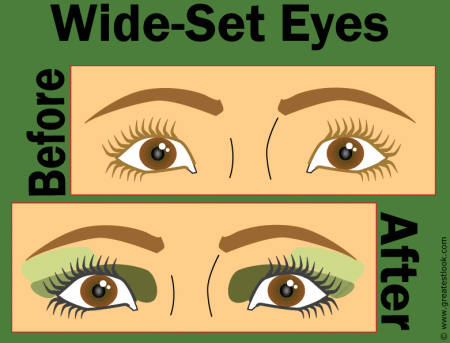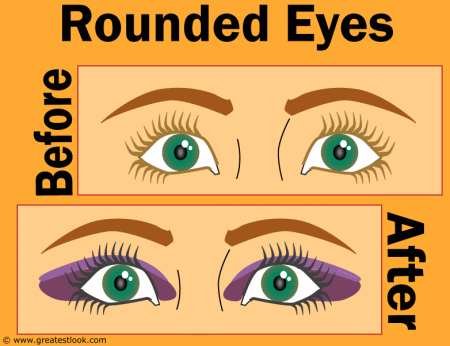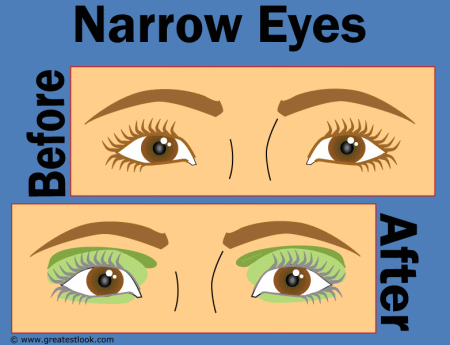So, in an attempt to help those who want to troubleshoot some of the more common "problem areas" when it comes to the eyes, here are a few tips and tricks to make the most of what you've got:
The most common problems when it comes to the eyes are the impression that the eyes are "too narrow", "too round", "too wide" or "too close together" to be appealing. The fact is that there are some cases where the shape or positioning of the eyes throws off the balance of the face, but most people see any flaws they may have as magnified. Try to remember that it only looks prominent to you because you see it every day. For most people, their wide, narrow, round or close eyes are only minimally so.
The trick to enhancing these features to look their best is to use your eye make-up to create contours and highlights to bring certain areas forward and make them look larger, while making other sections look smaller and move to the background. The particular areas and techniques depend on the specific situation.
Wide-Set Eyes:
 With widely-spaced eyes, many women feel that their faces are too broad, and that overall effect is that their face appears too wide or heavier than it actually is. In order to create the illusion that the eyes are closer together, you need to minimize the appearance of the area between the eyes.
With widely-spaced eyes, many women feel that their faces are too broad, and that overall effect is that their face appears too wide or heavier than it actually is. In order to create the illusion that the eyes are closer together, you need to minimize the appearance of the area between the eyes.This is accomplished by using a darker shade of eye make-up to create a contour on the inside of the eye. The contour should be sized approximately the width of the iris of the eye or at most one-half of the entire width of the eye from corner to corner. By darkening the area to the inside of the eyes, you make the eyes appear closer by making the space between the eyes appear lesser.
Use a medium shade of eye color on the lids of the eyes and a light shade to create a highlight on the upper outside of the brow. The lighter shade here will make the area appear larger and seem to "move" the eyes inward to the center. Blend the colors softly to create a gentle, subtle effect.
Close-Set Eyes:
 For closely-spaced eyes, the goal is to create the illusion of more space between the eyes, and to minimize the space to the outside corners of the eyes.
For closely-spaced eyes, the goal is to create the illusion of more space between the eyes, and to minimize the space to the outside corners of the eyes.To do this, we apply a darker contouring shade to the outside of the eyes, using roughly the same proportions as we used on the inside of the eyes above. We couple this with a medium shade of eye color to tie the shading together, and finish it by adding a highlight to the inside corners of the brow.
As before, be sure to blend the colors softly to create a subtle look.
Round Eyes:
 Round eyes are generally not a tremendous problem, except that some cases can result in the individual looking "too alert" or the eyes can appear to be bulging. To make the eyes appear wider, try creating contoured areas on both the inside and outside of the eyes, albeit thinner areas than used with the close-set or wide-set eyes.
Round eyes are generally not a tremendous problem, except that some cases can result in the individual looking "too alert" or the eyes can appear to be bulging. To make the eyes appear wider, try creating contoured areas on both the inside and outside of the eyes, albeit thinner areas than used with the close-set or wide-set eyes.This will help to create a horizontal focus to the eye, and makes them appear to be wider since the darker contours will appear less prominent. Couple this with a slim band of medium shade eye make-up following the crease of the eyelid. When you blend be sure to use horizontal strokes and keep a focus on width in creating this look.
Furthermore, when and if you use eyeliner, draw a thicker line at the outer and inner corners of the eye. This will help to emphasize the horizontal line of the eye and give the illusion of width.
Narrow Eyes:
 Narrow eyes present a slightly tougher problem for most people since you have to try to create the appearance that the eyes are larger, and open more widely. This can be tough to do, but the best bet for accomplishing this is to use a light shade of eye color on the upper lid of the eye and extend the color a it beyond the inner and outer corners.
Narrow eyes present a slightly tougher problem for most people since you have to try to create the appearance that the eyes are larger, and open more widely. This can be tough to do, but the best bet for accomplishing this is to use a light shade of eye color on the upper lid of the eye and extend the color a it beyond the inner and outer corners.In addition, apply a thin band of the light shade of color on the lower lid just below the lashes of the lower lid.
You also want to be sure to use a lighter mascara and eyeliner color to avoid making the look too dark and defeating the intention. Some women choose to use "white" eyeliner on the inside of the lashes to line the lid and make the eyes appear more open. However, you can use a medium shade of eyeliner on the outside of the lashes and use a light mascara to create an eye-opening effect.
One thing which I encourage everyone to do when you want to start "corrective" makeup applications, is to sit down a few times and practice the appropriate techniques. Practice will help you get comfortable with blending and creating a flattering look using techniques that may be unfamiliar to you. Furthermore, try practicing at different times of the day and under different lighting conditions so that you get a feel for "daytime" application versus "nighttime" make-up. The two looks should be different but will still have the same goal. Daytime make-up is generally lighter and softer, while evening make-up is darker and uses richer colors and more shimmer and sparkle effects.
No comments:
Post a Comment